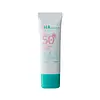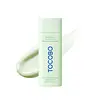What's inside
What's inside
 Key Ingredients
Key Ingredients

 Benefits
Benefits

 Concerns
Concerns

 Ingredients Side-by-side
Ingredients Side-by-side

Water
Skin ConditioningEthylhexyl Methoxycinnamate
UV AbsorberEthylhexyl Salicylate
UV AbsorberPropanediol
SolventCyclopentasiloxane
EmollientButylene Glycol
HumectantNiacinamide
SmoothingBis-Ethylhexyloxyphenol Methoxyphenyl Triazine
Skin ConditioningButyl Methoxydibenzoylmethane
UV AbsorberCetearyl Alcohol
Emollient1,2-Hexanediol
Skin ConditioningCetearyl Olivate
Glyceryl Stearate Se
EmulsifyingPolymethylsilsesquioxane
Behenyl Alcohol
EmollientTromethamine
BufferingSorbitan Olivate
EmulsifyingMethylene Bis-Benzotriazolyl Tetramethylbutylphenol
UV FilterAcrylates/C10-30 Alkyl Acrylate Crosspolymer
Emulsion StabilisingCarbomer
Emulsion StabilisingCetyl Palmitate
EmollientSorbitan Palmitate
EmulsifyingXanthan Gum
EmulsifyingEthylhexylglycerin
Skin ConditioningDecyl Glucoside
CleansingSorbitan Oleate
EmulsifyingAdenosine
Skin ConditioningMentha Piperita Oil
MaskingCentella Asiatica Extract
CleansingPropylene Glycol
HumectantCamellia Sinensis Leaf Extract
AntimicrobialMadecassoside
AntioxidantAsiaticoside
AntioxidantAsiatic Acid
Skin ConditioningMadecassic Acid
Skin ConditioningWater, Ethylhexyl Methoxycinnamate, Ethylhexyl Salicylate, Propanediol, Cyclopentasiloxane, Butylene Glycol, Niacinamide, Bis-Ethylhexyloxyphenol Methoxyphenyl Triazine, Butyl Methoxydibenzoylmethane, Cetearyl Alcohol, 1,2-Hexanediol, Cetearyl Olivate, Glyceryl Stearate Se, Polymethylsilsesquioxane, Behenyl Alcohol, Tromethamine, Sorbitan Olivate, Methylene Bis-Benzotriazolyl Tetramethylbutylphenol, Acrylates/C10-30 Alkyl Acrylate Crosspolymer, Carbomer, Cetyl Palmitate, Sorbitan Palmitate, Xanthan Gum, Ethylhexylglycerin, Decyl Glucoside, Sorbitan Oleate, Adenosine, Mentha Piperita Oil, Centella Asiatica Extract, Propylene Glycol, Camellia Sinensis Leaf Extract, Madecassoside, Asiaticoside, Asiatic Acid, Madecassic Acid
Water
Skin ConditioningDibutyl Adipate
EmollientButyloctyl Salicylate
Skin ConditioningButylene Glycol
HumectantEthylhexyl Triazone
UV AbsorberTerephthalylidene Dicamphor Sulfonic Acid
UV AbsorberBis-Ethylhexyloxyphenol Methoxyphenyl Triazine
Skin ConditioningPolyglyceryl-3 Distearate
EmulsifyingNiacinamide
SmoothingPolymethylsilsesquioxane
Tromethamine
Buffering1,2-Hexanediol
Skin ConditioningDiethylamino Hydroxybenzoyl Hexyl Benzoate
UV FilterCetearyl Alcohol
EmollientPentylene Glycol
Skin ConditioningPolysilicone-15
UV FilterHydrolyzed Safflower Flower Extract
Skin ConditioningGardenia Taitensis Callus Extract
AntioxidantCentella Asiatica Root Extract
Skin ConditioningCentella Asiatica Leaf Extract
Skin ConditioningCentella Asiatica Extract
CleansingAloe Ferox Leaf Extract
Skin ConditioningSodium Hyaluronate
HumectantSodium Polyacryloyldimethyl Taurate
Emulsion StabilisingGlyceryl Stearate
EmollientPotassium Cetyl Phosphate
EmulsifyingPoly C10-30 Alkyl Acrylate
Emulsion StabilisingGlycerin
HumectantPolyacrylate Crosspolymer-6
Emulsion StabilisingGlyceryl Stearate Citrate
EmollientInulin Lauryl Carbamate
Emulsion StabilisingAmmonium Acryloyldimethyltaurate/Vp Copolymer
Ethylhexylglycerin
Skin ConditioningAdenosine
Skin ConditioningDextrin
AbsorbentTocopherol
AntioxidantSaccharomyces Ferment Filtrate
HumectantDimethylsilanol Hyaluronate
HumectantHydrolyzed Sodium Hyaluronate
Skin ConditioningZinc Hydrolyzed Hyaluronate
HumectantPotassium Hyaluronate
Skin ConditioningHyaluronic Acid
HumectantAsiaticoside
AntioxidantSodium Hyaluronate Crosspolymer
HumectantHydroxypropyltrimonium Hyaluronate
Madecassoside
AntioxidantSodium Hyaluronate Dimethylsilanol
HumectantSodium Acetylated Hyaluronate
HumectantMadecassic Acid
Skin ConditioningAsiatic Acid
Skin ConditioningParfum
MaskingWater, Dibutyl Adipate, Butyloctyl Salicylate, Butylene Glycol, Ethylhexyl Triazone, Terephthalylidene Dicamphor Sulfonic Acid, Bis-Ethylhexyloxyphenol Methoxyphenyl Triazine, Polyglyceryl-3 Distearate, Niacinamide, Polymethylsilsesquioxane, Tromethamine, 1,2-Hexanediol, Diethylamino Hydroxybenzoyl Hexyl Benzoate, Cetearyl Alcohol, Pentylene Glycol, Polysilicone-15, Hydrolyzed Safflower Flower Extract, Gardenia Taitensis Callus Extract, Centella Asiatica Root Extract, Centella Asiatica Leaf Extract, Centella Asiatica Extract, Aloe Ferox Leaf Extract, Sodium Hyaluronate, Sodium Polyacryloyldimethyl Taurate, Glyceryl Stearate, Potassium Cetyl Phosphate, Poly C10-30 Alkyl Acrylate, Glycerin, Polyacrylate Crosspolymer-6, Glyceryl Stearate Citrate, Inulin Lauryl Carbamate, Ammonium Acryloyldimethyltaurate/Vp Copolymer, Ethylhexylglycerin, Adenosine, Dextrin, Tocopherol, Saccharomyces Ferment Filtrate, Dimethylsilanol Hyaluronate, Hydrolyzed Sodium Hyaluronate, Zinc Hydrolyzed Hyaluronate, Potassium Hyaluronate, Hyaluronic Acid, Asiaticoside, Sodium Hyaluronate Crosspolymer, Hydroxypropyltrimonium Hyaluronate, Madecassoside, Sodium Hyaluronate Dimethylsilanol, Sodium Acetylated Hyaluronate, Madecassic Acid, Asiatic Acid, Parfum
 Reviews
Reviews

Ingredients Explained
These ingredients are found in both products.
Ingredients higher up in an ingredient list are typically present in a larger amount.
1,2-Hexanediol is a synthetic liquid and another multi-functional powerhouse.
It is a:
- Humectant, drawing moisture into the skin
- Emollient, helping to soften skin
- Solvent, dispersing and stabilizing formulas
- Preservative booster, enhancing the antimicrobial activity of other preservatives
Adenosine is in every living organism. It is one of four components in nucleic acids that helps store our DNA.
Adenosine has many benefits when used. These benefits include hydrating the skin, smoothing skin, and reducing wrinkles. Once applied, adenosine increases collagen production. It also helps with improving firmness and tissue repair.
Studies have found adenosine may also help with wound healing.
In skincare products, Adenosine is usually derived from yeast.
Learn more about AdenosineAsiatic Acid is a major component of Centella Asiatica Extract. It has wound-healing, anti-inflammatory, and antioxidant properties.
Studies show Asiatic Acid is able to block the pathway for skin inflammation receptors, helping to soothe skin.
As an antioxidant, asiatic acid helps protect our skin against damaging environmental factors.
Learn more about Asiatic AcidAsiaticoside comes from the super popular skin-soothing ingredient, Centella asiatica. It is one of four active compounds found in the extract of Centella Asiatica.
Asiaticoside is an antioxidant and helps with wound healing. It has been shown to increase antioxidant activity during the wound healing process.
You might know this ingredient as Tinosorb S or Bemotrizinol. It is a UV filter that covers both UVA and UVB rays.
This ingredient has two peak UV absorption peaks ( 310 and 340 nm) and is able to absorb both UV-A and UV-B rays. This ingredient works by preventing UV rays from reaching and damaging your skin.
On top of that - it is highly photostable and helps prevent the photodegration of other sunscreen ingredients such as avobenzone.
Tinosorb S is allowed in the EU, Australia, and Asia. It is close to being approved by the FDA and we'll hopefully get this ingredient in the U.S. by late 2025.
Fun fact: Tinosorb S is the most effective UV absorber at maximum concentration (measured by SPF) permitted in the EU.
This ingredient is oil-soluble, so your oil-cleansers will take this right off at night.
Learn more about Bis-Ethylhexyloxyphenol Methoxyphenyl TriazineButylene Glycol (or BG) is used within cosmetic products for a few different reasons:
Overall, Butylene Glycol is a safe and well-rounded ingredient that works well with other ingredients.
Though this ingredient works well with most skin types, some people with sensitive skin may experience a reaction such as allergic rashes, closed comedones, or itchiness.
Learn more about Butylene GlycolCentella Asiatica Extract (Centella) is derived from an herb native to Southeast Asia. It is famous for its anti-inflammatory and soothing properties.
Centella is rich in antioxidants and amino acids, such as Madecassic Acid and Asiaticoside.
Studies show the compounds in centella help with:
The combination of all these properties makes centella effective at soothing, hydrating, and protecting the skin.
Other great components of centella include Vitamin A, vitamin C, several B vitamins, and Asiatic Acid.
Fun fact: Centella has been used as a medicine and in food for many centuries. As a medicine, it is used to treat burns, scratches, and wounds.
Learn more about Centella Asiatica ExtractCetearyl alcohol is a mixture of two fatty alcohols: cetyl alcohol and stearyl alcohol. It is mainly used as an emulsifier. Emulsifiers help prevent the separation of oils and products. Due to its composition, it can also be used to thicken a product or help create foam.
Cetearyl alcohol is an emollient. Emollients help soothe and hydrate the skin by trapping moisture.
Studies show Cetearyl alcohol is non-toxic and non-irritating. The FDA allows products labeled "alcohol-free" to have fatty alcohols.
This ingredient is usually derived from plant oils such as palm, vegetable, or coconut oils. There is debate on whether this ingredient will cause acne.
Due to the fatty acid base, this ingredient may not be Malassezia folliculitis safe.
Learn more about Cetearyl AlcoholEthylhexylglycerin (we can't pronounce this either) is commonly used as a preservative and skin softener. It is derived from glyceryl.
You might see Ethylhexylglycerin often paired with other preservatives such as phenoxyethanol. Ethylhexylglycerin has been found to increase the effectiveness of these other preservatives.
Madecassic Acid is a major component of Centella Asiatica Extract. It has anti-inflammatory and antioxidant properties.
It is a triterpenoid, meaning it naturally acts as an antioxidant. Antioxidants protect your skin against damage from environmental factors such as pollution and UV.
Studies show Madecassic Acid helps soothe the skin due to its ability to block inflammation pathways.
Learn more about Madecassic AcidMadecassoside comes from the super popular skin-soothing ingredient, Centella asiatica. It is one of four active compounds found in the extract of Centella Asiatica.
Madecassoside has antioxidant, anti-inflammatory, and hydrating properties. It contains fatty acids, amino acids, beta-carotene, and phytochemicals.
One study found using Madecassoside with ascorbic acid helped reduce the signs of aging and improved skin hydration.
Learn more about MadecassosideNiacinamide is a multitasking form of vitamin B3 that strengthens the skin barrier, reduces pores and dark spots, regulates oil, and improves signs of aging.
And the best part? It's gentle and well-tolerated by most skin types, including sensitive and reactive skin.
You might have heard of "niacin flush", or the reddening of skin that causes itchiness. Niacinamide has not been found to cause this.
In very rare cases, some individuals may not be able to tolerate niacinamide at all or experience an allergic reaction to it.
If you are experiencing flaking, irritation, and dryness with this ingredient, be sure to double check all your products as this ingredient can be found in all categories of skincare.
When incorporating niacinamide into your routine, look out for concentration amounts. Typically, 5% niacinamide provides benefits such as fading dark spots. However, if you have sensitive skin, it is better to begin with a smaller concentration.
When you apply niacinamide to your skin, your body converts it into nicotinamide adenine dinucleotide (NAD). NAD is an essential coenzyme that is already found in your cells as "fuel" and powers countless biological processes.
In your skin, NAD helps repair cell damage, produce new healthy cells, support collagen production, strengthen the skin barrier, and fight environmental stressors (like UV and pollution).
Our natural NAD levels start to decline with age, leading to slower skin repair, visible aging, and a weaker skin barrier. By providing your skin niacinamide, you're recharging your skin's NAD levels. This leads to stronger, healthier, and younger looking skin.
Another name for vitamin B3 is nicotinamide. This vitamin is water-soluble and our bodies don't store it. We obtain Vitamin B3 from either food or skincare. Meat, fish, wheat, yeast, and leafy greens contain vitamin B3.
The type of niacinamide used in skincare is synthetically created.
Learn more about NiacinamidePolymethylsilsesquioxane is a silicone used as a film forming agent.
When applied to the skin, this ingredient creates an invisible film on the surface. This film still allows oxygen to pass through, but prevents moisture from escaping. This can help condition and hydrate the skin. It also leaves a silky feel when applied.
Polymethylsilsesquioxane has not been shown to clog pores. It has been deemed safe to use up to 55%, but most cosmetics use much less.
If you have concerns about using this ingredient, we recommend speaking with a professional.
Learn more about PolymethylsilsesquioxaneTromethamine helps balance the pH and improve the texture of a product. It is synthetically created.
As an emulsifier, Tromethamine prevents oil and water ingredients from separating. This helps stabilize the product and elongate a product's shelf life. Tromethamine also makes a product thicker.
Tromethamine helps balance the pH level of a product. Normal pH level of skin is slightly acidic (~4.75-5.5). The acidity of our skin is maintained by our glands and skin biome. Being slightly acidic allows our skin to create an "acid mantle". This acid mantle is a thin barrier that protects our skin from bacteria and contaminants.
Oral Tromethanmine is an anti-inflammatory drug but plays the role of masking, adding fragrance, and/or balancing pH in skincare.
1,3-Propanediol, 2-amino-2-(hydroxymethyl)-
Learn more about TromethamineWater. It's the most common cosmetic ingredient of all. You'll usually see it at the top of ingredient lists, meaning that it makes up the largest part of the product.
So why is it so popular? Water most often acts as a solvent - this means that it helps dissolve other ingredients into the formulation.
You'll also recognize water as that liquid we all need to stay alive. If you see this, drink a glass of water. Stay hydrated!
Learn more about Water